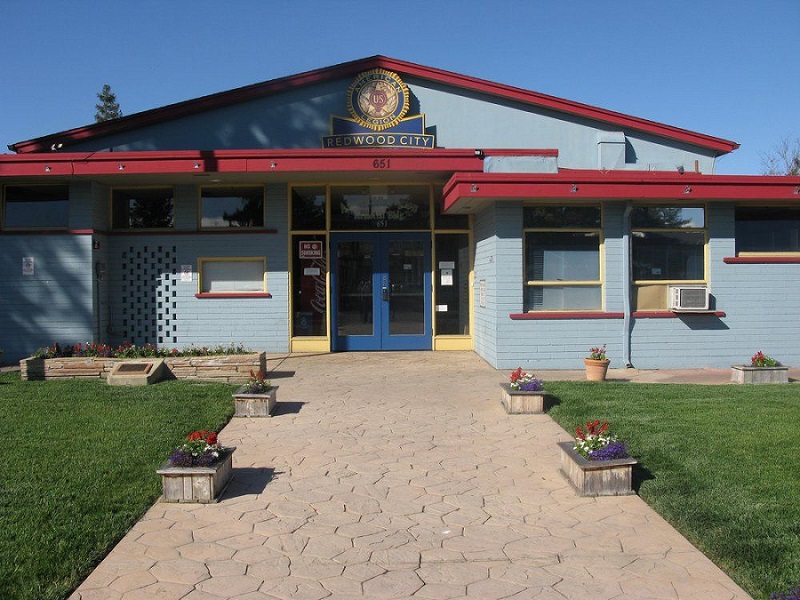Veterans Day will be special for Redwood City American Legion Post 105, which marked its 100th anniversary this year, highlighting a legacy that dates back to World War I, the hoped for “war to end all wars.”
On October 10, 1919, a group of World War I veterans met at Sequoia High School and formed the post with a charter signed by 130 men. By 1932, that figure had reached 150 and the Redwood City Tribune ran a feature story on the local legionnaires’ accomplishments, among them the formation of a drum and bugle corps that performed at patriotic events. Most of the praise, however, was heaped on the post’s sponsorship of Aviation Day, a 1921 event the newspaper said was “one of the largest events occurring in Redwood City.” Aviation Day featured 61 military aircraft as well as “a number” of civilian planes that participated at a time when the mere act of flying through the air was enough to capture the public’s imagination. Those who craned their necks witnessed planes participating in a 75-mile aerial derby as well as a flying circus highlighted by wingwalking and something called “plane changing.”
Post 105 was one of the many American Legion posts formed in 1919. In March of that year, war-weary American veterans of World War I, a savage conflict that ended with an armistice on Nov. 11, 1918, met in Paris to form a veterans’ organization. Two months later a national caucus was held in St. Louis and “The American Legion” was adopted as the official name, giving birth to Legion posts that soon sprang up across the United States. In addition to Post 105, the new contingents included Post 82 in San Mateo, which was organized on Sept. 29, 1919, and thus claims to be the “first continuously operating American Legion Post in San Mateo County.”
The two San Mateo County posts will join forces on Veterans Day, Nov. 11, at Courthouse Square in Redwood City to celebrate the 100th anniversary of their birth. The festivities which start at 10 a.m. will be followed by a barbecue at 1 p.m. served at the Post 105 building at 651 El Camino Real.
Over the years, the Legion, which today numbers more than two million members, has added to its accomplishments, particularly passage of the G.I. Bill. It was strongly backed by members who were World War I veterans. The former doughboys did not want to see World War II G.I.s end up as “forgotten men,” as many of them had been during the Great Depression. Today, November 11 honors all veterans, but at one time it simply recalled the day World War I ended. Today, the Legion is probably best known for its sponsorship of youth baseball teams and Boy Scout troops.
Something the local post should be better known for is its fight against discrimination. Post 105 stood up to a Legion organization called 40/8, which is the English translation of the long, French notice displayed on railroad boxcars indicating that the car could carry 40 soldiers or eight horses. The 40/8 group became known for trains — actually rubber-tired vehicles that pulled a boxcar in parades. Sounds harmless enough, but the 40/8 banned “non-whites” from membership. In 1959 Post 105 backed the national American Legion when it broke ties with the group by forbidding 40/8 from using the Legion name and emblem in its activities. At the time, the commander of Post 105 was Alan Jensen, who said the only requirement to join the Legion was an honorable discharge from the service.
The World War II tank that stands guard at Mezes Park is a visible reminder of Post 105’s ties to Redwood City. Post 105 helped bring the light Stuart tank to the park, site of the now long forgotten Mezes Hall, where the legionaries met before the hall on El Camino that is their home was built.
Post 105 has welcomed many members since 1919. Its most illustrious was Mitchell Paige who was awarded the Congressional Medal of Honor for his heroic action in the Solomon Islands in 1942. According to his citation, Paige, then a Marine Corps sergeant, single-handedly withstood a Japanese attack after all his men were either killed or wounded. In 1960, Paige, who lived in Redwood City for five years, was made a lifetime member of Post 105. He passed away in Southern California in 2003. His photo and a copy of his Medal of Honor citation hang on the entry wall at the Legion Hall.
This story was originally published in the November print edition of Climate Magazine.






